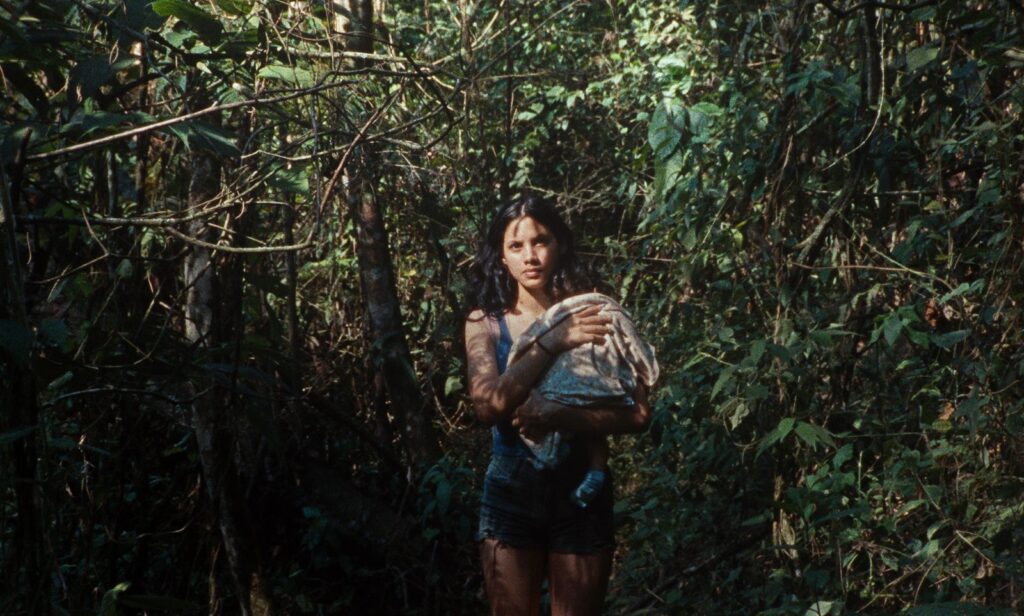At this year’s Sundance Film Festival, the short film Pasta Negra made a significant impact, offering audiences an intimate yet harrowing glimpse into the ongoing Venezuelan socio-economic crisis. Directed by Venezuelan filmmaker Jorge Thielen Armand, Pasta Negra tells the story of three women crossing the border in search of something as simple as pasta. But beneath this seemingly mundane quest lies a deep exploration of survival, dignity, and the devastating effects of political and economic collapse.
The film is an adaptation of the short story Tijeras by Venezuelan author Karina Sainz-Borgo, which also inspired her novel No Place to Bury the Dead. Armand, who has experienced the chaos of the Venezuela-Colombia border firsthand, was deeply affected by what he saw there. “I lived through some difficult experiences with corrupt officials, paramilitaries, and a sense that anything bad could happen at any moment,” he shares. “You can really see how bad things have gotten in Venezuela when Colombia on the other side of the bridge feels like Switzerland against our dilapidated state.”
A Fable Rooted in Reality
While many films attempt to explain Venezuela’s crisis, Armand chose a different approach. Pasta Negra is not a documentary-style exposé, but rather a deeply human story about how the crisis manifests in the daily lives of ordinary people. “I don’t intend to explain the Venezuelan crisis in my films. News can’t even do that. Instead, I show how it affects the people that live it—inside or in exile,” Armand explains. “In the case of Pasta Negra, I set out to depict how the crisis affects our bodies with fear and deprivation, our trust in one another, and our dignity.”
Shot on 16mm film, Pasta Negra takes on a poetic, almost fable-like quality that both distances and immerses the viewer. The film’s long shots allow the audience to sit with the characters’ emotions, while the vintage aesthetic softens the harshness of their reality. “This is indeed a film about losing a piece of yourself, or your identity, in exchange for a meal,”Armand says.

Authenticity in Performance and Setting
In an effort to keep the film as authentic as possible, Armand cast non-professional actors—Venezuelan women who had migrated to Colombia, many of whom had experienced the hardships depicted in the film. He chose them not just for their stories but for their emotional depth. “They were special. Not only for their looks but also because of their sensibilities and connection to one another,” he shares.
To preserve their raw emotions, Armand employed an unconventional approach. The actors never read the script; instead, they learned the story through rehearsals and discovered their scenes as they were shot. This method created an organic and deeply personal dynamic, particularly in the case of the film’s grandmother figure. “Something very powerful happens to her at the end after her granddaughter gives her that smile,” he reflects. “It’s not acting or a direction I gave her… some past feelings were evoked when we arrived at that house, and the actress had gotten very close at that point.”
A Cross-Border Collaboration
Filming in Venezuela was not an option due to security and budget concerns, so the production took place in and around Cali, Colombia. While this presented its challenges, it also freed Armand from personal attachments to locations, allowing him to focus on performance and artistic execution. “We had to find Venezuela in Colombia and live with some things that were different,” he explains.
The film was a collaboration between multiple countries, a necessity given Venezuela’s lack of funding for cinema. With production support from Italy, Colombia, and Taiwan, Pasta Negra benefited from diverse perspectives. “It was useful to have different worldviews as we approached the final cut and made decisions on the sound design,” Armand notes. “There are so many different readings to some of the things that happen in this film.”

A Political Statement by Default
For Armand, ignoring the crisis in his storytelling would be an act of complicity. “The crisis has to be present in all Venezuelan contemporary films. If it’s not, then those filmmakers are actually complicit with a regime that wants to pretend everything is nice and normal,” he states. His films are unapologetically bleak because, in his eyes, that’s the truth of his homeland. “My films are depressing and hopeless because that’s how I feel about my country. I’m sure I’m not alone in that.”
The Aftermath and the Bigger Picture
The reception at Sundance was a mix of praise and criticism, but Armand sees this as a positive sign. “We received a lot of nice comments, but also some nasty ones. It’s not a film for everyone, and that’s good. It requires some work and attention to many small details,” he says.
Ultimately, Armand hopes Pasta Negra will reach audiences who need to see it most. As Venezuela continues to face political turmoil, many of its citizens live in exile, caught in a limbo of uncertainty. Armand acknowledges the film’s limitations in changing the broader situation but hopes it sparks conversations. “Our work as artists has been done. The articles were written, the books, the films have been screened, the photos have been displayed, the testimonies have been shouted in every corner of the world… Now we sit and wait for a war? Or perhaps we prefer a slow death ala Cubana?”
With Pasta Negra, Armand brings a powerful, deeply personal story to the global stage—one that is as urgent as it is poetic. Whether audiences watch with admiration, discomfort, or debate, the film undeniably forces them to confront the reality of a crisis too often overlooked.
About Jorge Thielen Armand
Jorge Thielen Armand is an award-winning Venezuelan filmmaker known for his deeply personal and socially conscious storytelling. His films, including La Soledad, La Fortaleza, and Pasta Negra, explore themes of migration, survival, and the Venezuelan socio-political crisis. With a unique blend of documentary and fiction, Armand’s work has been recognized at major international festivals such as Sundance, Venice, and Toronto.
To learn more about his films and upcoming projects, visit www.tarmand.com.









